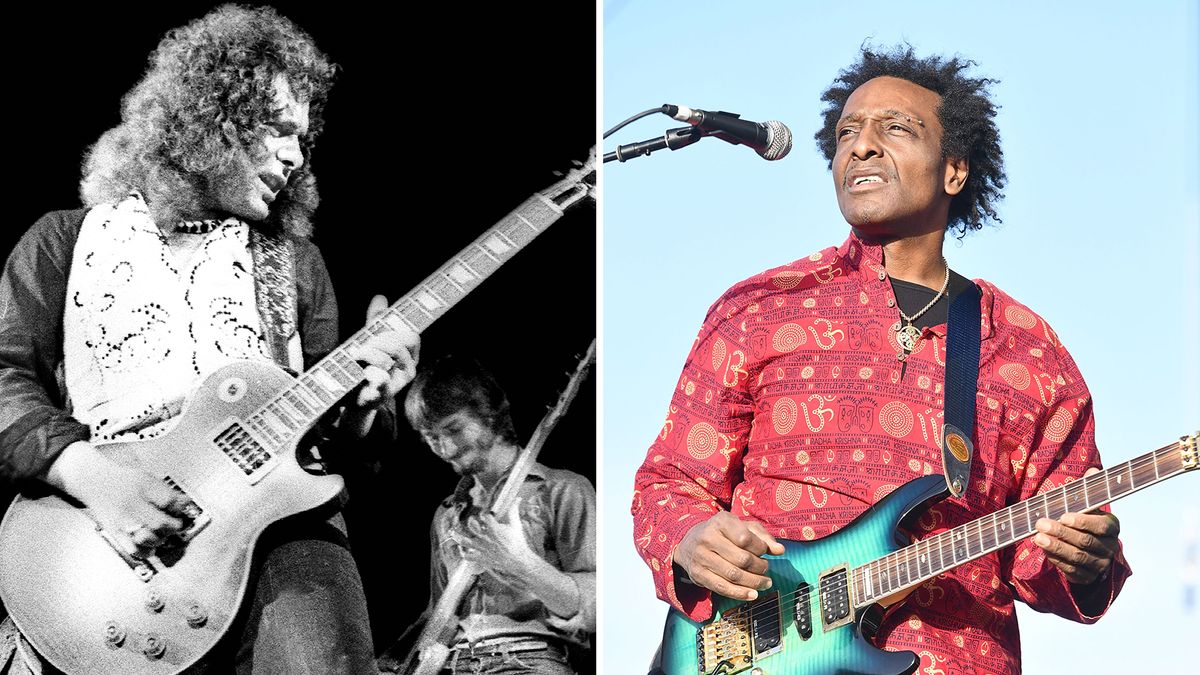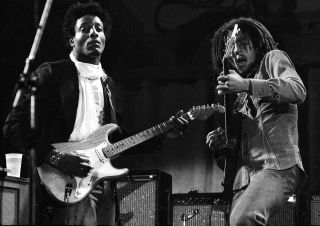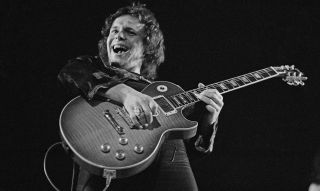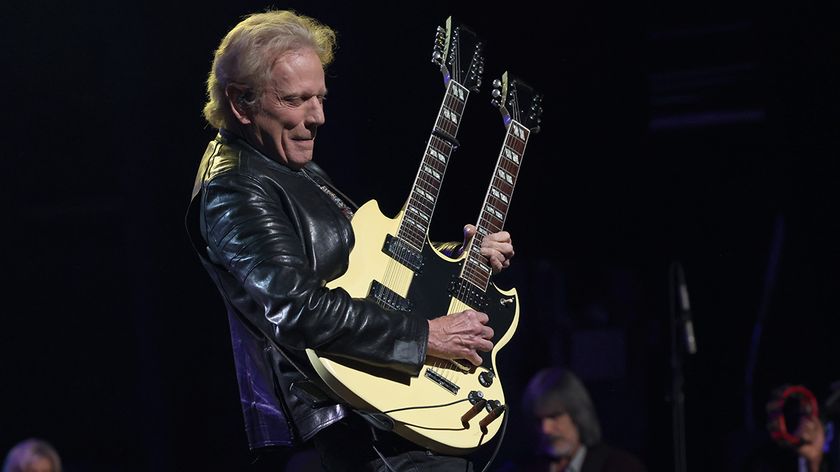“Paul Kossoff goes, ‘I’m not really in the mood. I have a friend here who can cut it.’ If it wasn’t for him I could be working at McDonald’s”: Bob Marley and the Wailers’ Al Anderson on the night he went from an unknown guitarist to tracking Natty Dread
Koss had to teach him the basics of reggae guitar as he waited for a cab to the studio. A couple of hours later he’d tracked the solos for Marley classic Natty Dread

Former Bob Marley and the Wailers guitarist Al Anderson – the man behind the emotive, singable solo on the classic live version of No Woman No Cry – is well-known for sharing memories from throughout his storied career via his Facebook page.
Between extensive tour dates where he celebrates the musical legacy he helped to shape, and while he’s creating new music with the Original Wailers, Anderson generously offers eyewitness accounts of flanking Marley, Peter Tosh and others, onstage and in the studio.
Earlier this year he revealed that his introduction to the Wailers – and to roots reggae – had come from a source so unexpected that Guitar World needed to find out more. Because while Anderson was familiar with early reggae pioneer Jimmy Cliff, he wound up in the Wailers’ world via Free guitarist Paul Kossoff.
The pair met shortly after Anderson relocated from Montclair, New Jersey to London, England in 1970. The move had come about after an encounter with Chris Blackwell, owner of Island Records – to which Free were signed – when Traffic had played at New York’s Filmore East. Blackwell offered Anderson’s band Shatkatu a deal, hence the transatlantic trip, and Traffic’s Chris Wood steered Anderson towards Kossoff.
“Paul was exceptionally kind to me,” Anderson says. “I used to go over his house all the time. He had the best guitar collection I had ever seen! He had everything – ‘50s and ‘60s Strats, SGs, Marshall Majors, 50-watts, small box 100-watt Plexi, Orange. He had such knowledge of vintage guitars back in the early 70s. He knew what they would be worth in the future.”
One night at Kossoff’s place, a phone call changed Anderson’s life. “It was Chris Blackwell, asking Paul to come and do a session,” he recalls. “Paul goes, ‘I’m not really in the mood.’ He'd been drinking pretty heavily – but I was pretty sober. He said, ‘I have an American friend here who can cut it.’ So they sent me a minicab.”
While they waited, Kossoff gave Anderson a crash course in reggae. “I’d never heard Bob. Paul played Catch A Fire and Burnin’ for me. I was like, ‘Wow, this is interesting – I don't know where beat one is!’ So Paul counts, ‘And one, two, three, four,’ and hipped me.”
Get The Pick Newsletter
All the latest guitar news, interviews, lessons, reviews, deals and more, direct to your inbox!
One cab ride later, Anderson arrived at Island Studios, where the recording of Marley classic Natty Dread (1974) was in progress.
“I had a Clyde McCoy wah wah, ‘57 Blonde Strat and a Twin Reverb,” he remembers. “I walked straight in the studio. Chris said, ‘This is Bob. Let’s go to work.’ I didn’t get a chance to meet him until after we did a couple of couple of takes!”

Thrown in at the deep end, those initial takes were rejected; but Anderson’s remarkable versatility meant he soon adapted to Marley’s requirements.
“I was playing jazz rock on top of reggae, and it wasn’t there. They didn't like it so much. I said, ‘OK, give me an opportunity to hear some more tracks.’
“After the third or fourth track I said, ‘I know exactly what they want.’ It had a country feel to it, simple 1-4-5 chord structure. I said, ‘Just run the track. We’ll make it happen.’”
Bob was really happy that he was completing the album with the guitar sound he had in his head
As the tape rolled, he laid down solos on No Woman No Cry, Them Belly Full (But We Hungry) and Rebel Music (3 O’Clock Roadblock) in rapid succession. He remembers he “did the whole record in about 45 minutes,” adding: “I went into the control room. They were elated, so happy. ‘It’s exactly what we were looking for. You got the sound. You tagged it!’”
Job done, Anderson returned to Kossoff’s place. “He said, ‘What was it like?’ I said, ‘He had a lot of hair!’”
He says of Marley: “Bob was very quiet and cool. He had a spliff in his hand, and he was really happy that he was completing the album with the guitar sound he had in his head.”

Shortly thereafter, Anderson received a phone call from Island Records. “They said I should come down and have a conversation about joining Bob Marley and the Wailers. I got the deal – ended up flying to Kingston, where Bob met me and tried to get me into the Jamaican state of mind.”
Tragically, as Anderson’s star was in the ascendent, Kossoff’s battle with addiction continued to weaken his health, precipitating his death at the age of 25 in March 1976. Today, Anderson is keen for his late friend to be remembered in a good light.
“I owe everything to that guy,” he states. “He was a wonderful, wonderful brother. I'm just sorry he’s not around so I can thank him for all that he’s done for me. If it wasn’t for Paul Kossoff, I could be working at McDonald’s now.”
- Check out the Original Wailers’ upcoming tour dates.
Rich Davenport is guitarist and vocalist with punk/ska punk/punky reggae merchants Vicious Bishop, and is a former member of Radio Stars, Atomkraft, and Martin Gordon’s Mammals. He swears by Orange amps and pedals, which is entirely appropriate for a ginger. In addition to making loud noises, he’s also written about loud noises for Classic Rock, Record Collector, Vive Le Rock, and Rock Candy. He’s interviewed such six-stringers as Ritchie Blackmore, Joe Bonamassa, Michael Schenker, Ty Tabor (Kings X), Peter Tork (The Monkees), Scott Gorham (Thin Lizzy), Pat McManus, Steve Hunter (Alice Cooper, Lou Reed), Ed King (Lynyrd Skynyrd), Vivian Campbell (Dio, Def Leppard), George Lynch (Dokken), Steve Lukather (Toto) and Lita Ford.

“I look up the tracks, I’m like, ‘Oh, that’s him.’ It’s the tone, the touch, the feel, the voicing choices”: Rhythm guitarists are harder to identify on recordings than lead players. But there’s one rhythm king that Cory Wong can pick out without fail

“I called Alice and said, ‘I'm in a lot of pain. I’m not too sure what's going on’”: Orianthi reveals her agony over the injury that forced her to pull out of her Alice Cooper tour return – and play Back in Black sitting down at PRS’ epic anniversary show
Most Popular










